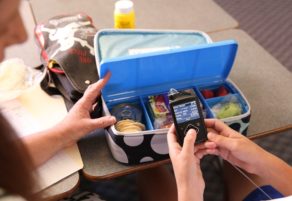It takes a team approach to support students to manage their diabetes in the school environment
Students with type 1 diabetes need a support network at school.
So, it is important that school staff, principals, parents, carers, and health professionals all work together to ensure students with type 1 diabetes are supported in the school environment.
Every student with type 1 diabetes will have different needs, so each member of their school support team plays an important role and need to work together to make sure they stay healthy and able to enjoy all the experiences that school life has to offer.
 |
 |
 |
 |
 |
Members of a student’s school diabetes team
Diabetes treating teams are the health professionals who work with families to support and treat children and young people with type 1 diabetes. They are often hospital based, including a medical specialist (endocrinologist), diabetes educator and others.
The diabetes treating team play a significant role in developing a young person’s diabetes management plan in collaboration with parents or carers. The diabetes management plan describes what is needed to manage a young person’s type 1 diabetes. It includes important information on the medical treatment the student needs, including understanding and monitoring blood glucose level ranges and how insulin is administered.
It is important that the student’s diabetes treating team keep the plan updated as this is what parents and carers and the school will use to inform the support that will be provided in the school environment. The team has a role in providing information, advice and training to parents and carers and the school.
Schools, principals and school staff have an important role in ensuring that students with type 1 diabetes experience a supportive and inclusive learning environment, and a key aspect of this is ensuring that their health and care needs are accommodated.
Schools have an obligation to make reasonable adjustments to support a students’ type 1 diabetes management so they may participate fully in school life and reach their full learning potential. The school should discuss proposed adjustments with parents or carers and agree upon the supports that may be provided to a student with diabetes to enable them to participate fully in school and educational activities. This may include meeting the student’s daily health care needs, including support with monitoring blood glucose levels and administering insulin.
Parents or carers need to work closely with principals and designated staff in schools. The principal has an overarching responsibility to ensure that all school staff receive the appropriate training about how diabetes can affect students. Principals should identify staff members, known as designated staff, who volunteer to take on the responsibility of supporting a student with managing their diabetes at school. In some states, responsibility for supporting student health needs will already be agreed as part of the staff member’s condition of employment. Designated staff should undertake additional training to equip them with the skills, knowledge and understanding to provide the necessary support to students with type 1 diabetes. It is important for parents and carers to keep in close communication with designated staff about any changes to the student’s condition or treatment needs.
Young people with type 1 diabetes should be encouraged to take a proactive role in managing their own health needs. They should be encouraged to participate in decisions about the management of their condition so that they have the confidence to tell school staff and their parents or carers what supports they might need at school.
 |
 |
 |
 |
 |
 |
 |











